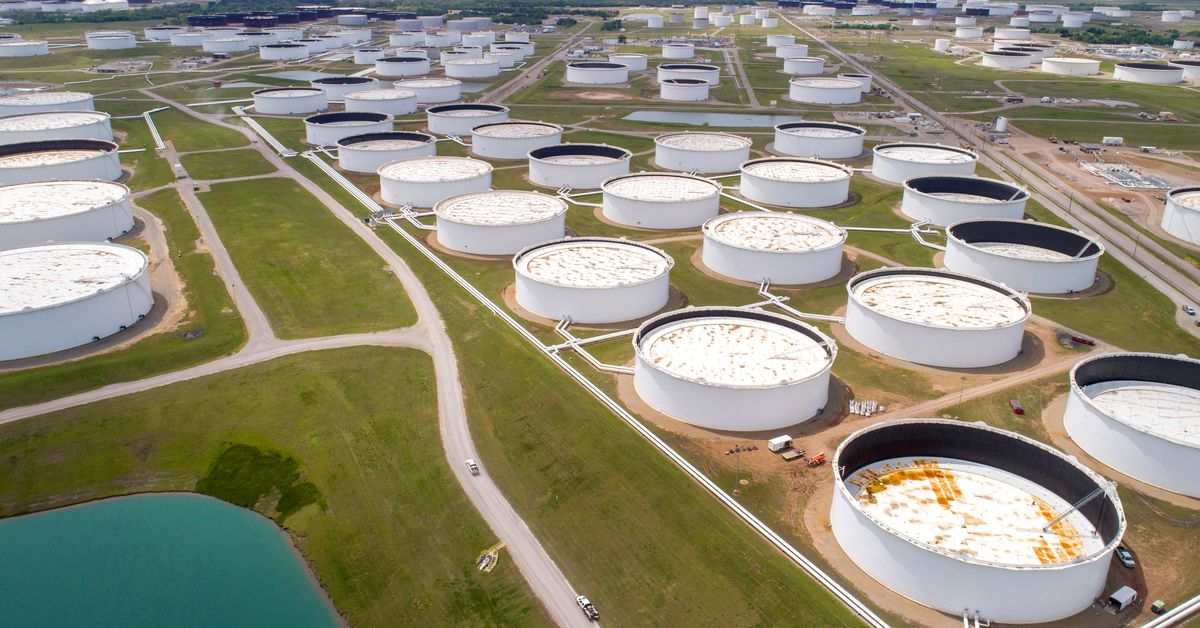Oil rises over 1% as Mideast tensions face virus concerns

Crude oil storage tanks are seen in an aerial photograph at the Cushing oil hub in Cushing, Oklahoma, U.S. April 21, 2020. REUTERS/Drone Base/File Photo
Summary Israeli aircraft strike rocket launch sites in Lebanon -military Delta surge in China prompts more restrictions and flight cuts
NEW YORK, Aug 5 (Reuters) – Oil prices rose more than 1% on Thursday on increasing Middle East tensions, but gains were capped as fresh restrictions to counter a surge in COVID-19 cases threatened the global energy demand recovery.
Brent crude oil futures rose 91 cents, or 1.3%, to settle at $71.29 a barrel, after earlier dipping below $70 for the first time since July 21. U.S. West Texas Intermediate (WTI) crude futures rose 94 cents, or 1.4%, to settle at $69.09 a barrel.
Both benchmarks fell more than $2 on Wednesday to a two-week low.
“Yesterday it was really all about concerns about the Delta variant, and then today there were worries that maybe we overdid it,” said Phil Flynn, senior analyst at Price Futures Group in Chicago. “We saw an increase in geopolitical risk as well.”
Israeli jets struck what its military said were rocket launch sites in Lebanon early on Thursday in response to two rockets fired towards Israel from Lebanese territory, in an escalation of cross-border hostilities amid heightened tensions with Iran. read more
The exchange came after an attack on a tanker off the coast of Oman last Thursday, which Israel blamed on Iran. Two crew members, a Briton and a Romanian, were killed. Iran denied any involvement. read more
Asked if Israel was prepared to strike Iran, Israeli Defence Minister Benny Gantz told YNet news on Thursday “yes.”
The growing tensions come as nuclear talks between Iran and Western powers that would ease sanctions on Tehran’s oil exports appear to have stalled.
“With tensions brewing amongst Iran and world powers over last week’s drone attack, it seems nuclear deal talks will be lengthy and unlikely to provide imminent sanction relief for Iran,” said Edward Moya, senior analyst at OANDA.
Offsetting the geopolitical tensions, concerns over the recovery of global oil demand grew amid a surge in coronavirus cases.
Japan is poised to expand emergency restrictions to more prefectures while China, the world’s second-largest oil consumer, has imposed curbs in some cities and cancelled flights, threatening fuel demand. read more
“China is now facing its most challenging COVID-19 crisis since the initial outbreak was brought under control,” analysts at consultancy FGE said in a note on Thursday.
In the United States, the world’s biggest oil consumer, COVID-19 cases hit a six-month high with more than 100,000 infections reported on Wednesday, according to a Reuters tally. read more
Analysts at investment bank UBS, however, said they expect oil prices to resume their upward trend despite pandemic concerns, projecting Brent crude will trade between $75 and $80 per barrel in the second half of 2021.
Reporting by Stephanie Kelly in New York; Additional reporting by Ron Bousso in London and Jessica Jaganathan in Singapore; Editing by Marguerita Choy and Jason Neely
Our Standards: The Thomson Reuters Trust Principles.






